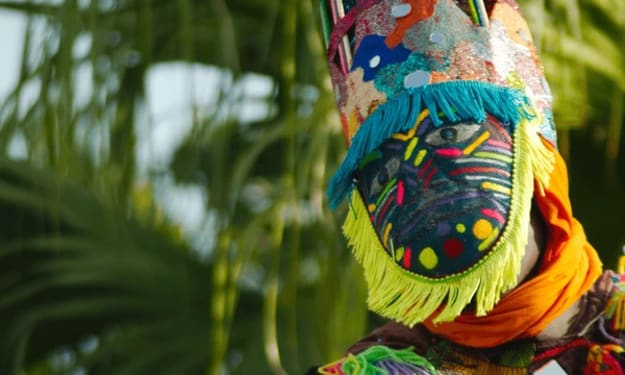Content warning
This story may contain sensitive material or discuss topics that some readers may find distressing. Reader discretion is advised. The views and opinions expressed in this story are those of the author and do not necessarily reflect the official policy or position of Vocal.
Trauma Leaves a Mark
Harry Potter and Me: How I Grew Up Reading and Loving My Own Life Story

If you had asked me ten, even five years ago, I would have said there would never be a day when I wouldn’t love Harry Potter. Now, I’m not so sure. Not because I don’t still appreciate the series greatly, but because my relationship to it has changed. Greatly.
Growing up, I always felt just shy of normal. I blamed many things for this–my large front teeth reminiscent of Hermione’s, my bushy brown hair (also reminiscent of Hermione’s), my above-average height throughout grade school, my precocious maturity and early puberty. In reality–though they didn’t help–none of these things were the cause of my complex. The truth was, I simply didn’t feel at home in my body. I felt awkward and self-conscious pretty much everywhere I went, and no amount of self-love or self–acceptance was going to change that. Writing this now, it sounds like a sad existence–but I had never known any different, and I was happy and loved enough at home to make up for it.
As soon as I was old enough to become conscious of feeling this way, along came Harry Potter. Like many children of my generation, I grew up alongside Harry, Ron, and Hermione. I begged my parents to read yet another chapter before we went to sleep, and camped out until midnight for the movie premieres. I loved the whimsy of the world J.K. Rowling had created, and the fun of imagining who I would be in the realm of Harry Potter. I probably became more encyclopedic about the books than I was about any other topic.
However, what was at once the most comforting and enticing thing about Harry Potter for me was the idea of some other world where I would feel like… me. Where I would meet “my people,” the other witches and wizards of the world, who had been waiting for me all along. Where I would not only unquestionably belong, but actually feel like I did. Where I would feel comfortable in my own skin and in touch with my own magic. It was a tempting notion–the idea that my discomfort was simply because I wasn’t in the right place with the right people. Each time I escaped to Hogwarts, for those few hours, I was free.
Of course, I grew up, and a few decades of projecting this Hogwarts fallacy onto each new place I went taught me that my problem wasn’t so easily solved. The clincher came when I left for college, certain I was going to meet the people who would finally make me feel I belonged, only to encounter exactly the opposite situation.
The lesson had finally hit home. No amount of friendship or acceptance, no matter how pure, was going to make me feel whole in the places I did not. But in this rough lesson, a seed of truth with the power to set me free: it had never been about anyone else. It had never been about belonging, witches vs. Muggles, my friends or lack thereof. It had always been about me.

In the next few years, as I started going to therapy and exploring various healing modalities (somatic healing being the main one), I began to feel particularly drawn toward rewatching the Deathly Hallows. I felt as if I was noticing the scar on Harry’s forehead for the first time. Though I knew the story like the back of my own hand, somehow, I had never seen it as much more than a scar left by violence. But it was so much more. Voldemort – a metaphor for any dark force – had attempted to annihilate Harry. Failing this – because the body is resilient, and because Harry is a wizard, after all – Voldemort’s magic could only manage to leave a permanent mark on Harry, storing within him the trauma of the experience. From that moment on until their connection was released, Voldemort would always be a part of Harry.
The best part of this connection is how profoundly subconscious it is. Throughout the series, we never see any of Harry’s traits inherited from the Dark Lord – his ability to speak to snakes, his periodic glimpses into Voldemort’s mind – as alien to him in any way. They always feel just like Harry. In this same way, I never had any inkling that my feelings of awkwardness and insecurity were anything other than personality traits. How could I? Like Harry, I had been marked from birth–or at least before conscious thought. How can you return to a self that you can’t even remember? How can you heal trauma you’re not aware you have?
Some trauma, like the kind we commonly think of in our culture, is experiential. Other traumas can penetrate our systems from experiences we never consciously had. In my case, extreme stress in my mother’s body – a generational story I have only just begun to unravel – seeped into my body before I had even left the womb. Is it any wonder I never felt relaxed in my skin? By the time I entered the world, my nervous system’s capacity was maxed out, and all my subsequent experiences – like issues with acceptance and belonging – just became more emotions my body couldn’t process. So they remained there, stored in my tissue, my own personal Horcruxes.
This story is not meant to belittle the experiences of those who have survived much greater trauma. I know how fortunate I have been in my life circumstances, and I wouldn’t trade my journey for anything. If anything, I believe my story shows how nondiscriminatory trauma truly is. At its core, trauma is not about a specific type of event or emotion. Trauma happens when the body simply says: Enough. I can’t process anymore. In this way, we can recognize the liberating truth that while our experiences make us who we are, we are also, maybe paradoxically, not our experiences. We are especially not those things that our body has stored for our later retrieval. If anything, we are the transcendence of them.
In Harry Potter and the Deathly Hallows, Harry’s hunt for the Horcruxes is a grim and dire mission to destroy the remaining pieces of Voldemort’s soul. Only then can the darkness in their world – and within Harry – be expunged once and for all.
I’m here to offer a different view. What if we’re all here to excavate and set free our own Horcruxes? Whether they’re buried in your body, behind a mask or somewhere in your past, we all have pieces of ourselves that we’ve lost along the way. The journey of healing – or as I like to call it, life – is the journey of reclaiming those pieces. It’s a profoundly fulfilling journey that I wouldn’t trade for anything. As Harry’s story shows us, there is no more worthwhile adventure than the one that leads you right back home to yourself.
About the Creator
Enjoyed the story? Support the Creator.
Subscribe for free to receive all their stories in your feed. You could also pledge your support or give them a one-off tip, letting them know you appreciate their work.






Comments (9)
I couldn't stop reading. Your writing was really well done!
This is all of our stories combined. You have spoken to all of our spirts in this apt interpretation of the trials of the human spirit. We all have to find a way to find our own journey to our authentic self. It is a lonely journey. You are doing what it takes by owning it and sharing it. It can only get better. Now you have eyes and hands to reach across the void to hear you. Brava dear Joelle.
When we lost Keenan, a pastor friend sent us a series of pamphlets on grief. Admittedly, there wasn't much I didn't already know from seminary classes & almost three decades in ministry that was contained therein. But this one nugget sticks with me. The authors asked the question, "What grief is the worst kind of grief?" Their answer? "Your own." The same is true of any trauma. None of it should be minimized or discounted, whether it stems from abuse, tragedy, loss, or your mother's system simply having too much cortisol. I'm glad to hear that you are finding your way back to yourself through therapeutic excavation & whatever else you might be doing. Be well.
This is an interesting interpretation of the series and a beautiful representation of what it means to you. Well done! 😀
This is incredible. Such a beautiful message here ❤️
Well-done Joelle. Really made me think. Insightful and philosophical.💙Anneliese
So well written Joelle. Personal narrative is captivating and the notes of wisdom are spot on. Trauma happens when the body simply says: Enough. I can’t process anymore. Absolutely!! When you said we are and are not our trauma… that we are the transcendence of it… I wanted to applaud!!! ✨❤️ brilliant, beautiful writing
My jaw literally dropped when you mentioned your own personal horcruxes! Like whoaaa, this whole revelation blew my mind! I've read and watched Harry Potter so many times, but never made this connection! This was so profound! So through healing, we find our own personal hocruxes and get rid of them! You are bloody brilliant! I'll be nominating this for Top Story on Discord!
Well written!